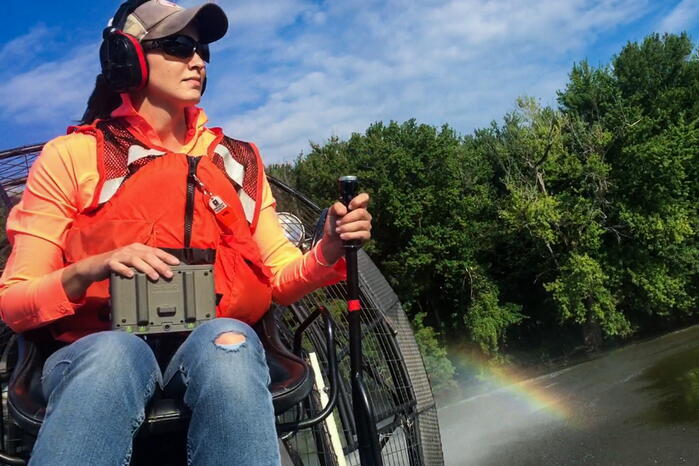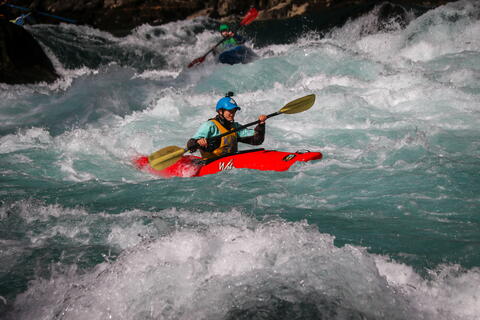A lifeline on the river: Elizabeth Bruns’ journey from survivor to steward

Elizabeth Brooks Bruns’ journey from a farm girl to a civil engineer for the U.S. Army Corps of Engineers was not without its challenges. Diagnosed with cancer at age 13, and facing several recurrences, Elizabeth had to pause her education multiple times in her teens and early twenties. “It gave me space to think about what I liked to do and took away the pressure to pick a career too quickly,” she recalls.
Initially, her experiences with cancer drew her toward a career in biomedical engineering. However, her hometown sweetheart and future husband, Justin Bruns, introduced her to the field of agricultural engineering — a path that harmonized her love of nature and her aptitude for math and science.
Elizabeth chose to join Justin in the Department of Agricultural and Biological Engineering, part of the College of Agricultural, Consumer and Environmental Sciences and The Grainger College of Engineering at the University of Illinois Urbana-Champaign.
She chose to specialize in soil and water resource engineering and immersed herself in undergraduate research, helping with field-scale trials for nitrate removal from tile drainage. This hands-on experience opened the door to her passion for water quality and led to an internship with the U.S. Army Corps of Engineers. She also traveled abroad to assist with field trials in India and Sierra Leone — opportunities that broadened her perspective on global water challenges.
After graduating in 2009, Elizabeth joined the Corps’ Rock Island District in the water quality and sedimentation section. She now leads a team responsible for flood risk management and emergency response along the Illinois River.

During major floods — like the historic, record-breaking 2019 event on the Illinois River — Elizabeth coordinates daily briefings, sends real-time updates, and addresses issues alongside her field teams. “Our job is to be the eyes on the ground and to offer technical support to local officials and levee commissioners,” she said.
Her work also involves navigating high-stakes discussions with diverse stakeholders, including local governments, the towboat industry, and railroads. “There’s a lot of coordination, and sometimes tough conversations are needed to balance everyone’s priorities while keeping safety at the forefront,” she said. “Floods are stressful, but being able to provide some clarity and help people feel supported in those moments makes it worthwhile.”
Elizabeth’s work also involves ecosystem restoration along the Mississippi River; she and her team monitor water quality and work to restore habitats by adjusting flow and improving conditions for aquatic life. These efforts not only improve water quality but also aim to create a more resilient river ecosystem that can withstand future environmental pressures.
“We’re trying to restore what was lost while ensuring that these ecosystems can support the life that depends on them,” she explained. “Restoring side channels and increasing flow can help create habitats where endangered mussels and other species can flourish.”
To reach and monitor these remote locations, Elizabeth and her team use airboats to navigate shallow waters and icy conditions that would be impassable for other vessels. “Being out there, making real-time decisions — it’s a really challenging and rewarding part of the job,” she said.

Elizabeth’s passion for water extends beyond her career. After her second bout with cancer, she joined a trip to Colorado with First Descents, an organization that offers outdoor adventures for young adults impacted by cancer. This experience not only helped her heal but also sparked a lifelong love for whitewater kayaking, navigating rivers from Oregon to Patagonia.
Now a certified kayak instructor, Elizabeth volunteers with First Descents to give back to others facing similar challenges — a service mindset that mirrors her work with the U.S. Army Corps of Engineers.
This year, Elizabeth was awarded the ABE department’s Young Alumni Achievement Award for her technical expertise and dedication to public service and environmental stewardship. Whether she’s coordinating emergency response teams, championing river restoration projects, or supporting cancer survivors, Elizabeth’s career and volunteerism reflect her drive to make a meaningful impact.
“Receiving this award is a tremendous honor,” Elizabeth said. “It’s a reflection of the community that has supported and encouraged me throughout my journey. I’m grateful for the opportunities I’ve had to contribute to both my field and to others, and I hope to continue making a positive impact in the years to come.”
The ABE Distinguished Alumni Award was established in 2008 and the Young Alumni Achievement Award was introduced in 2020 to recognize alumni who have achieved significant success and distinction in their careers. Awardees are selected for their contributions to their professions and the lasting impact they have made in their fields. Nominations are accepted through an online submission form.